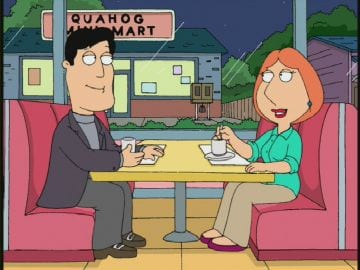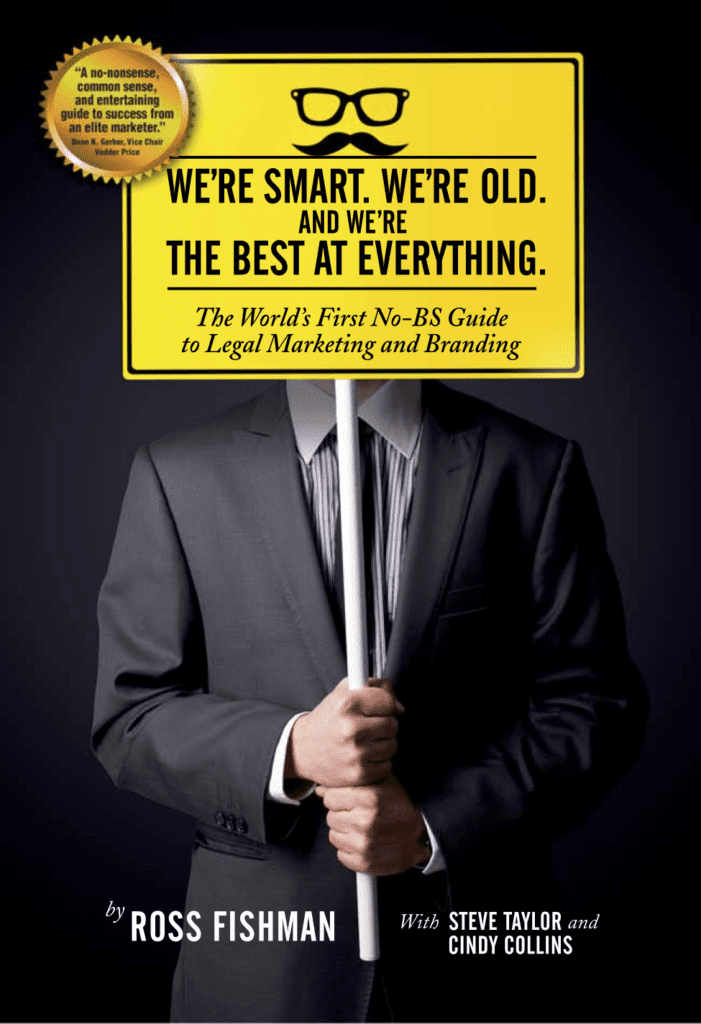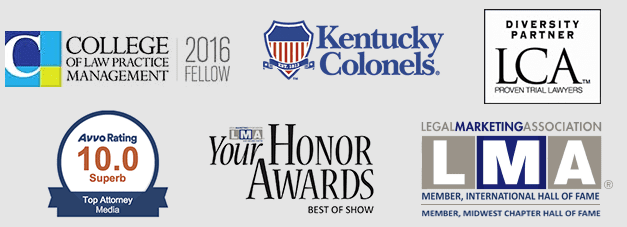“Holy sh*t. The Family Guy writers think you’re hilarious, Ross.”
.– Danny Smith, Executive Producer, Family Guy*
I’ll bet some of you suddenly think I’m pretty darn funny. Why? Because testimonials from credible sources are extremely persuasive. As such they should be a vital part of your marketing arsenal. [That’s an actual quote, BTW. More on Family Guy at the end.]

Ross Fishman, Family Guy, with Lois
Consider two marketing approaches. You can:
- Tell me that you’re awesome, or
- Have a giddy client say the exact same thing.
The first one is bragging, it’s rude, and lacks credibility.
The second one is persuasive, professional, and trustworthy. Fundamentally, in marketing, don’t tell me you can do something, show me that you’ve done it — and ideally have a happy client to prove it.
Note that client testimonials, endorsements, and reviews had been prohibited in some fashion by Rule 7.1 of the American Bar Association Model Rules of Professional Conduct in roughly half the states as a potentially “false or misleading communication.” The ABA’s 2016 update has helped many states loosen up their rules, permitting truthful testimonials. Check your state’s rules.
The Top 10 Rules for Client Endorsements:
1. Name the source
If you don’t tell me exactly who said that wonderful thing about you, I doubt it’s true. Specificity creates credibility. Here’s a quick test ― if you saw this on Dave Pinsel’s** law firm website, which of the following signatures is more convincing?
“Dave is a terrific lawyer!”* [signed]
– “Client”
– Tiffany, Fortune 500 company
– Tiffany R. Jones, Associate General Counsel, General Electric
Obviously, it’s the last one, because it identifies the specific person, title, and company. It makes me feel like I could contact this person to double check if I wanted to. And the (a) better-known the recommender, (b) bigger the title, and (c) more prestigious the company, the better the endorsement.
2. Tell them what you want it to say
You might want it to focus on a particular feature, style, or brand attribute you want to convey, e.g. being tough, creative, or service oriented. Detailed guidance makes a testimonial easier to write. For example, “Do me a favor, can you talk about how efficiently we handled your case?”
Most satisfied clients are happy to do this. It’s really not a big deal; they know how the game is played. They’re most likely to simply respond, “Sure, just write something for me to sign.” That’s ideal; this way you can get precisely what you need.
3. Use simple English
Make it sound like something people might actually say. Take out the marketing fluff and puffery. Don’t make me suspect that it was written and thrice-edited by a large, dull marketing committee.
4. Shorter is better
I see a lot of lengthy testimonials on law firm websites. I don’t read them. Many well-intentioned endorsements you receive will be entire paragraphs, with unnecessary specificity. Edit it into a single tight sentence or two if possible. Think in terms of movie quotes, i.e. short, active blurbs, like “Brett understood our industry better than any lawyer we’ve ever worked with!” Just because a client wrote it doesn’t mean you must use the whole thing verbatim. But be sure your edit remains true to the original. In my experience, most testimonials will arrive with a friendly “feel free to edit it” comment from the author anyway.
5. If they say it, get it in writing
Often, you’ll receive a gracious comment from someone, like “You really did a terrific job negotiating the deal!” If you know that they sincerely mean it, you can respond “Thanks, that’s so nice of you to say. Would you do me a favor? Could I quote you? I’m supposed to collect some quotes for our website. Would it be OK if we put that on the website?” They’re usually happy to let you turn their comments into quotes. And if you don’t do it immediately, you’re likely to forget and lose the opportunity.
6. Get explicit permission
Of course, you must always get the recommender’s approval to use the quote. A client might have said something nice to you face-to-face or in a private email, but have a strict corporate policy against providing public endorsements. Don’t anger good clients by using their name without explicit permission. First, it’s simple courtesy.
Second, lawyers have a high duty of confidentiality regarding their client representations (Rule 1.6), including revealing client names and examples. Check your state’s ethics rules here too.
7. Spread it across the Internet
Don’t forget to add it to your website biography and LinkedIn profile. You can ask for a Recommendation on LinkedIn with a simple click; LinkedIn makes it easy to ask for them, and you want prospects who are looking you up to see them.
Once you have a few positive endorsements to use on your website and LinkedIn, start asking satisfied clients to post them to the review sites that Google ranks highly e.g. Yelp, Merchant Circle, Avvo, Martindale.com, etc. If these sites are going to show up anyway when someone searches for your name, they might as well show up with a comment from someone saying you’re fabulous.
8. Reciprocate
Obviously, there’s no obligation to immediately write something nice about the client, but it would certainly be nice to return the favor. They have careers too, and would likely benefit by having their boss and professional connections see a prominent lawyer recommending them. Simply go to their LinkedIn profile and click “Write a Recommendation.” You may even tell them that you’re going to [“Oh, it’s OK, you don’t have to.” “I know but I want to, it’s been such a pleasure working with you!”], and ask them what they’d like it to say. Just be sure you mean it.
9. Don’t write your own
It can be tempting to short-cut the process and write your own awesome endorsements, or have your family and employees secretly do so. Don’t do it. Both the FTC and bar associations frown upon this deceptive conduct, called “astroturfing.”
10. How to request a testimonial
Just ask. But many professionals won’t ask, because it feels demeaning. So, here’s what you do ― blame Marketing. Try this:
“I’m sorry to ask, but Marketing has been harping on us to get client testimonials. Can you do me a favor? Can you write me something short about how practical our approach was in this deal? It’d get them off my back. I’d really appreciate it.”
It’s that simple. Blame someone else if asking makes you uncomfortable. If they were happy with your work, they’ll be happy to dash off a quick sentence or two for you. Really, it’s no biggee.
** (Dave Pinsel actually is a terrific divorce lawyer, he’s a friend of mine.)
* More Family Guy
Finally, the actual Family Guy quote, excerpted from an email Danny Smith sent me, was:
“Holy shit, Ross, you really got me with that first e-mail… Thank God you let me out of jail with that second e-mail. Tell your kids I said their father is a real smart-ass. I showed your email to the other Family Guy writers, and they think you’re hilarious.”
I edited out some extraneous sentences for brevity. If you want to hear the whole funny “Family Guy” story, buy me a beer one day. BTW, there’s actually a “Ross Fishman” character, he’s Lois’s college boyfriend. I’m not going to link to him, I’m tired of fighting a cartoon character for page 1 of Google searches for my name.
Image (c) 1998 Family Guy, FOX
———————–
Need a new brand or website?
Contact Ross for more information at +1.847.921.7677 or ross@fishmanmarketing.com.
And read the definitive book on the subject, “We’re Smart. We’re Old. And We’re the Best at Everything. The World’s First No-BS Guide to Legal Marketing and Branding” available at Amazon:



